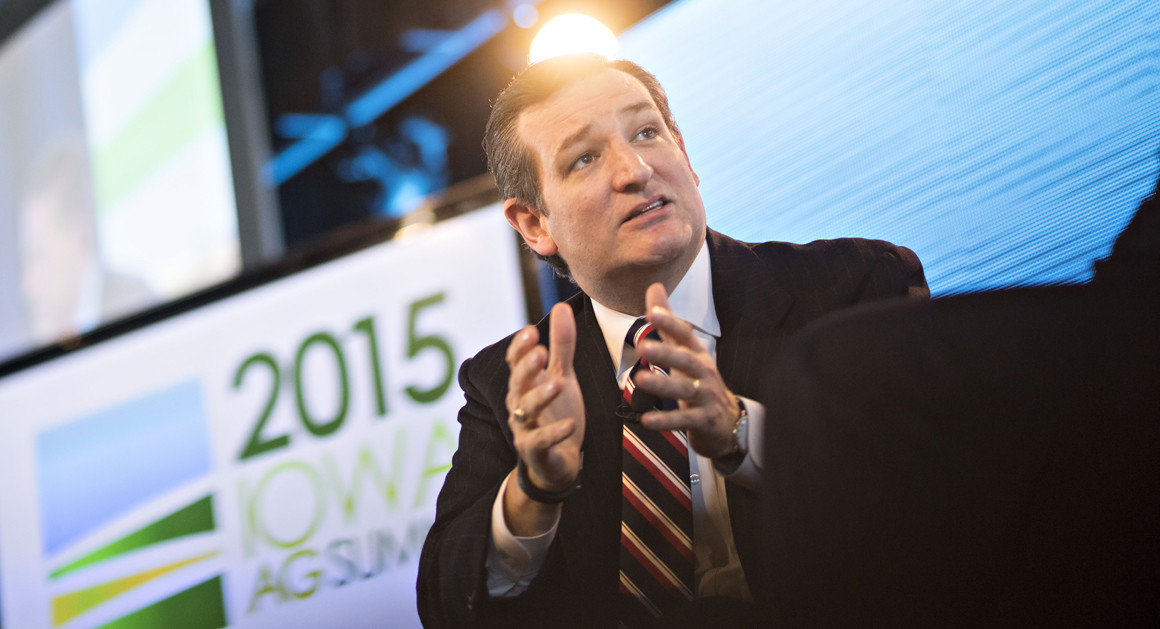
With the Iowa caucuses less than two months away, Ted Cruz seemed to have an epiphany Thursday night on one of the state’s — and agricultural lobby’s — biggest issues in Congress.
The GOP senator from Texas initially voted with fiscal hard-liners to retain $3 billion in crop insurance cuts that were made as part of a budget deal approved in October. After a visit to the Senate cloakroom, Cruz returned and flipped his vote to side with farming interests, which ultimately prevailed. The crop insurance votes were part of a debate on a highway bill, which Cruz opposed on a final vote, calling it fiscally irresponsible.
Cruz’s presidential rivals and fellow senators, Rand Paul of Kentucky and Marco Rubioof Florida also joined the popular effort to protect the restoration of the crop insurance money but voted against the final bill. After taking several minutes deliberating whether to side with farmers, Rubio drew sarcastic applause from his colleagues during the draining seven-hour voting slog on Thursday night. Sen. Lindsey Graham (R-S.C.), who is also running for president, voted for the crop insurance funding and the overall highway bill.
The issue put the Republican presidential hopefuls in an especially tough spot, testing their stated commitment to fiscal conservatism against the real-life demands of a critical first-in-the-nation voting state. Other fiscal conservatives in the Senate, such as Jeff Sessions of Alabama and Mike Lee of Utah, opposed the insurance program, as did a number of liberals, including Sen. Elizabeth Warren (D-Mass.).
Though he considers himself the most principled conservative in the Senate, Cruz has been nuanced on the agriculture insurance program that carries major heft in Iowa and other heartland jurisdictions. At a September Rural Town Hall in Nashville, Tennessee, Cruz said “there is an important federal role in crop insurance” when asked why he voted against last year’s farm bill. But he also wants major reforms to the program.
Neither Paul nor Rubio appeared to agonize over the Thursday vote as Cruz did. A spokesman for Cruz said the senator always intended to vote to support the crop insurance program.
“The series of votes on the highway bill was changed and he voted NO believing he was voting on cloture for the highway bill. Once he realized it, he changed his vote to YES,” Phil Novack said.
But the series of events on the floor appeared more dramatic. Toward the end of the roll call, Cruz strode onto the Senate floor, studied how his colleagues had voted, then voted against restoring the crop insurance.
Cruz was immediately collared by Senate Agriculture Committee Chairman Pat Roberts (R-Kan.), and the two talked for a minute or so as Cruz listened intently. He turned to Republican Secretary of the Senate Laura Dove and gave the “just a minute” signal before walking to the cloakroom.
Two minutes later, Cruz approached the clerk and changed his vote.
The cuts to crop insurance represented the most politically charged spending reform in this year's budget deal, and, within hours of announcing the deal this fall, leaders were already intent on reversing it.
Cruz said that he voted against the 2014 farm bill mostly because of its food stamps provisions, not over crop insurance. But he added that farmers should have more choices than the federal crop insurance program and that wealthy farmers should not benefit from it inordinately.
“Whether it’s Obamacare or crop insurance. When you have the federal government stepping in, it ends up limiting choices and driving up prices,” Cruz said in September. “There are reasonable reforms to have subsidies focused on smaller farmers, lower income farmers. And I don't think we necessarily need to be in the business of providing major subsidies to large conglomerate agricultural operations. But there is certainly an important role in providing agricultural stability.”
- Publish my comments...
- 0 Comments
